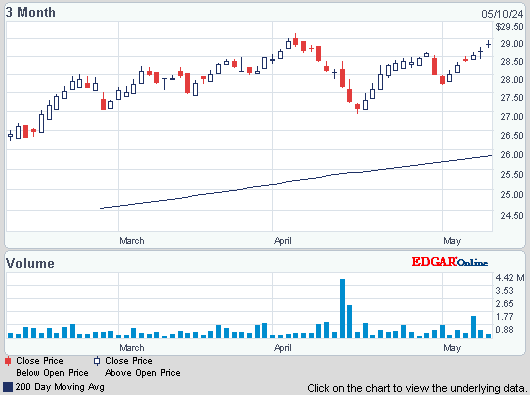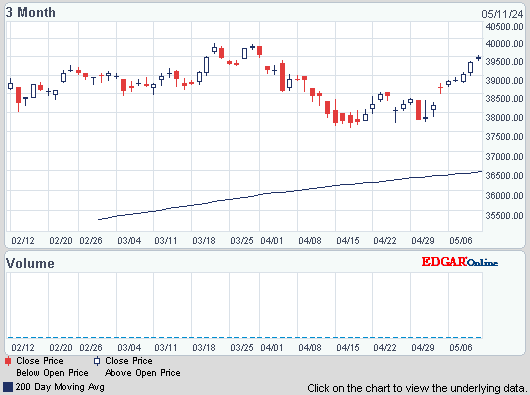Dow shot up 156, advancers ahead of decliners 5-2 & NAZ was up 17 The Financial Index was up 2+ to the 217s (but sideways for about 2 months). The MLP index rose 3 to 404 (some of the gain might come from a lack of ex-distributions today) & the REIT index was up a smidgen in the 261s (after trading sideways for months). Junk bond funds gained & Treasuries slipped back. Oil rose while gold is pushing to go over $1700 again.


Photo: Bloomberg
Greece headed for a cliffhanger vote on austerity measures needed to keep the bailout on track as a 48-hour general strike began & European officials squabbled over the timing of a deal to unlock rescue funds. EU Economic & Monetary Affairs Commissioner Olli Rehn, speaking at a meeting of G-20 finance ministers, said yesterday that a deal must be made at a meeting of EU finance ministers in Brussels on Nov 12. But a European G-20 official, speaking before Rehn, cast doubt on the prospects for that deadline, saying officials may fall short. Greece is under pressure to make more efforts to rein in its budget deficit & deregulate the economy. While German Chancellor Merkel last month travelled to Greece to signal her willingness to keep Greece in the euro, the country is still struggling to hit its debt reduction targets amid a combination of Greek political resistance to more cuts and economic collapse. Greece has received €240B ($307B) in aid pledges from the EU & IMF since 2010. The parliament’s finance committee today agreed to fast- track a bill of austerity measures & economic reforms submitted by Prime Minister Samaras’s gov late yesterday. Lawmakers must ratify the bill for Greece to ensure speedy payment of the next bailout & avoid bankruptcy, Finance Minister Yannis Stournaras said. This story remains stuck in neutral.
Greece Faces Cliffhanger Vote as General Strike Begin

Photo: Bloomberg
German factory orders fell the most in a year in Sep as Europe's sovereign debt crisis & slowing economic growth prompted companies to reduce investment. Orders, adjusted for seasonal swings & inflation, slumped 3.3% from Aug, when they dropped a revised 0.8%, the Economy Ministry in Berlin said. That’s the 2nd straight drop & the biggest since Sep 2011. The forecast was for a 0.4% decline. From a year earlier, orders sank 4.7% when adjusted for work days. Europe’s largest, is showing signs of weakness as govs & consumers across the region reduce spending, damping export demand. Business confidence fell to the lowest in more than 21/2 years in Sep & the unemployment rate rose from a 2-decade low. At the same time, Germany is weathering the debt crisis better than its euro-area counterparts thanks to exports to emerging markets & domestic demand. German domestic factory orders fell 1.8% from Aug & export orders dropped 4.5%, driven by a 9.6% plunge in sales to other euro- area countries. Investment-goods orders declined 2.4% & consumer-goods orders were down 1.7%. Orders fell 2.3% in Q3 from Q2. While bulk orders were below average in Sep, “the weak economic environment in the euro area and in the broader global economy is having a bigger impact on demand for German industrial goods,” it said. “Therefore industrial production may weaken further in the months to come.” When the strong economy is struggling, the euro economy is in bad shape.
German Factory Orders Slump the Most in a Year: Economy

Photo: Bloomberg
US job openings dropped to a 5-month low in Sep, signaling uneven progress in the labor market. The number of positions waiting to be filled declined 100K to 3.56M from a revised 3.66M in the prior month, according to the Labor Dept said. Hiring & layoffs also decreased. Jobs may be harder to come by as more companies retrench in the face of a slowing global economy the fiscal cliff. The figures show the Oct gain in private employment, the biggest in 8 months, will probably be difficult to sustain without faster economic growth. The number hired in Sep dropped to 4.19M, pushing down the hiring rate to 3.1% from 3.3%. Declines in job openings at professional & business services, gov & manufacturing accounted for much of the decrease in available employment. Openings increased in education & health services as well as the trade, transportation & utilities industries. Total layoffs, excluding retirements & those who left their job voluntarily, decreased to 1.7M from 1.85M a month before. Another 1.98M quit their jobs in Sep, down from 2.15M in the prior month, driving the total separations rate to 3% from 3.3%. In the 12 months ended in Sep, the economy created a net 1.8M jobs, representing 51.6M hires & 49.8M separations. More gloomy data on the economic recovery.
Job Openings in U.S. Decreased by 100,000 in September
While waiting for the election results,sellers decided to watch from the sidelines. News is on the dismal side, especially out of Europe, but buyers are not worried. Independent of the election results, the fiscal cliff (bringing tax increases & budget cuts) will start looming larger tomorrow. But Dow continues at the high end of an 8 day narrow trading range. Maybe sellers will return after lunch.

AMJ (Alerian MLP Index tracking fund)
Treasury yields:
U.S. 3-month |
0.102% | |
U.S. 2-year |
0.278% | |
U.S. 10-year |
1.695% |
| CLZ12.NYM | ...Crude Oil Dec 12 | ...86.21 | ... | (0.7%) |
| GCX12.CMX | ...Gold Nov 12 | ....1,690.10 | ... | (0.5%) |

Photo: Bloomberg
Greece headed for a cliffhanger vote on austerity measures needed to keep the bailout on track as a 48-hour general strike began & European officials squabbled over the timing of a deal to unlock rescue funds. EU Economic & Monetary Affairs Commissioner Olli Rehn, speaking at a meeting of G-20 finance ministers, said yesterday that a deal must be made at a meeting of EU finance ministers in Brussels on Nov 12. But a European G-20 official, speaking before Rehn, cast doubt on the prospects for that deadline, saying officials may fall short. Greece is under pressure to make more efforts to rein in its budget deficit & deregulate the economy. While German Chancellor Merkel last month travelled to Greece to signal her willingness to keep Greece in the euro, the country is still struggling to hit its debt reduction targets amid a combination of Greek political resistance to more cuts and economic collapse. Greece has received €240B ($307B) in aid pledges from the EU & IMF since 2010. The parliament’s finance committee today agreed to fast- track a bill of austerity measures & economic reforms submitted by Prime Minister Samaras’s gov late yesterday. Lawmakers must ratify the bill for Greece to ensure speedy payment of the next bailout & avoid bankruptcy, Finance Minister Yannis Stournaras said. This story remains stuck in neutral.
Greece Faces Cliffhanger Vote as General Strike Begin

German factory orders fell the most in a year in Sep as Europe's sovereign debt crisis & slowing economic growth prompted companies to reduce investment. Orders, adjusted for seasonal swings & inflation, slumped 3.3% from Aug, when they dropped a revised 0.8%, the Economy Ministry in Berlin said. That’s the 2nd straight drop & the biggest since Sep 2011. The forecast was for a 0.4% decline. From a year earlier, orders sank 4.7% when adjusted for work days. Europe’s largest, is showing signs of weakness as govs & consumers across the region reduce spending, damping export demand. Business confidence fell to the lowest in more than 21/2 years in Sep & the unemployment rate rose from a 2-decade low. At the same time, Germany is weathering the debt crisis better than its euro-area counterparts thanks to exports to emerging markets & domestic demand. German domestic factory orders fell 1.8% from Aug & export orders dropped 4.5%, driven by a 9.6% plunge in sales to other euro- area countries. Investment-goods orders declined 2.4% & consumer-goods orders were down 1.7%. Orders fell 2.3% in Q3 from Q2. While bulk orders were below average in Sep, “the weak economic environment in the euro area and in the broader global economy is having a bigger impact on demand for German industrial goods,” it said. “Therefore industrial production may weaken further in the months to come.” When the strong economy is struggling, the euro economy is in bad shape.
German Factory Orders Slump the Most in a Year: Economy

Photo: Bloomberg
US job openings dropped to a 5-month low in Sep, signaling uneven progress in the labor market. The number of positions waiting to be filled declined 100K to 3.56M from a revised 3.66M in the prior month, according to the Labor Dept said. Hiring & layoffs also decreased. Jobs may be harder to come by as more companies retrench in the face of a slowing global economy the fiscal cliff. The figures show the Oct gain in private employment, the biggest in 8 months, will probably be difficult to sustain without faster economic growth. The number hired in Sep dropped to 4.19M, pushing down the hiring rate to 3.1% from 3.3%. Declines in job openings at professional & business services, gov & manufacturing accounted for much of the decrease in available employment. Openings increased in education & health services as well as the trade, transportation & utilities industries. Total layoffs, excluding retirements & those who left their job voluntarily, decreased to 1.7M from 1.85M a month before. Another 1.98M quit their jobs in Sep, down from 2.15M in the prior month, driving the total separations rate to 3% from 3.3%. In the 12 months ended in Sep, the economy created a net 1.8M jobs, representing 51.6M hires & 49.8M separations. More gloomy data on the economic recovery.
Job Openings in U.S. Decreased by 100,000 in September
While waiting for the election results,sellers decided to watch from the sidelines. News is on the dismal side, especially out of Europe, but buyers are not worried. Independent of the election results, the fiscal cliff (bringing tax increases & budget cuts) will start looming larger tomorrow. But Dow continues at the high end of an 8 day narrow trading range. Maybe sellers will return after lunch.










No comments:
Post a Comment